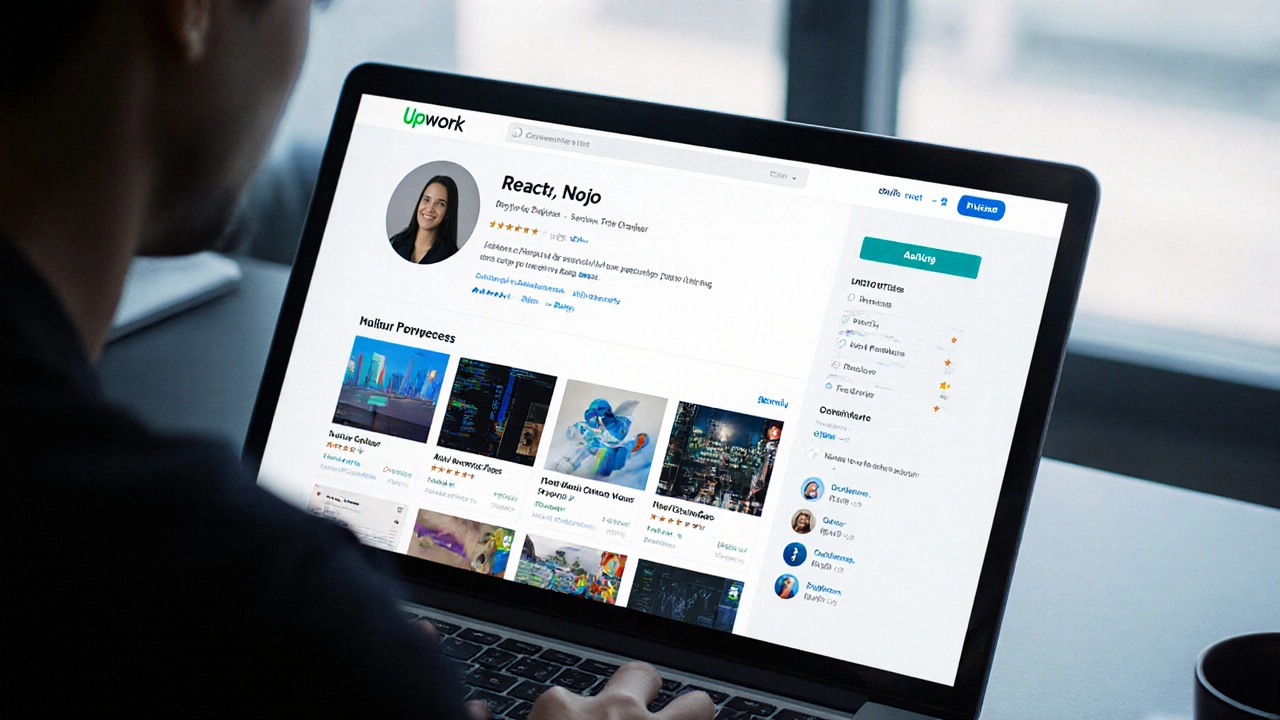Is Upwork Worth It for Web Developers? A Deep Dive
Upwork Earnings Calculator
Upwork uses a tiered fee structure:
- First $500 billed → 20% fee
- $500.01–$10,000 → 10% fee
- Above $10,000 → 5% fee
Client Payment:
Platform Fees:
Net Earnings:
The fee structure is tiered: 20% on first $500, 10% on next $9,500, 5% on amounts above $10,000.
Quick Takeaways
- Upwork offers a massive client pool but takes a 10%‑20% service fee.
- Web developers can earn $30‑$120+ per hour, depending on niche and reputation.
- Success hinges on a strong profile, niche focus, and disciplined proposal writing.
- Competing platforms like Fiverr and Toptal may suit different skill levels or pricing models.
- Upwork is worth it if you treat it like a business and manage fees and client expectations.
Upwork is a global freelance marketplace that connects independent professionals with clients seeking project‑based work. Launched in 2015 after the merger of Elance and oDesk, it now hosts millions of job postings across tech, design, writing, and more.
How Web Developers Use Upwork
When a web developer signs up, the first step is creating a profile that reads like a mini‑portfolio. The platform lets you showcase past projects, list programming languages (React, Node.js, Python, etc.), and attach work samples or GitHub links. After verification, you can start bidding on two main contract types:
- Hourly contracts-you log time via Upwork’s desktop app, which captures screenshots and activity levels for client transparency.
- Fixed‑price contracts-you agree on a total fee, set milestones, and get paid when each milestone is approved.
Both models are protected by Upwork’s Payment Protection system, which holds funds in escrow for fixed‑price jobs and ensures hourly work meets the “no‑surprises” billing rule.
Earnings Potential for Web Developers
According to the Upwork 2024 Freelance Earnings Report, the median hourly rate for web developers sits at $45. Top‑performing specialists in niche areas like e‑commerce integration or performance optimization can command $100-$150 per hour. Fixed‑price projects typically range from $500 for a simple landing page to $10,000+ for a full‑stack application.
Keep in mind the platform’s tiered fee structure:
- First $500 billed to a client → 20% fee.
- $500.01-$10,000 → 10% fee.
- Above $10,000 → 5% fee.
That means a $2,000 project nets you $1,800 after fees, whereas a $12,000 project only loses $600.

Pros of Working on Upwork
Large client base: With over 12million clients, you can find niche projects that match your stack.
Built‑in payment security: Escrow and hourly monitoring reduce the risk of late or missing payments.
Reputation system: Positive reviews boost visibility and allow you to raise rates over time.
Tools for collaboration: Integrated time‑tracker, messaging, and file‑sharing keep everything in one place.
Cons to Watch Out For
High competition: Thousands of developers vie for the same jobs, especially entry‑level gigs.
Service fees: The 20% fee on the first $500 can eat into small‑project margins.
Client vetting: Not every client is reliable; you’ll need to read reviews and ask clarifying questions.
Platform dependence: Relying solely on Upwork can be risky if policy changes affect payouts.
How Upwork Stacks Up Against Other Freelance Platforms
| Feature | Upwork | Fiverr | Toptal | Guru |
|---|---|---|---|---|
| Typical fee structure | 20‑10‑5% tiered | 20% flat | 5% flat (after screening) | 9% flat |
| Client vetting level | Open marketplace | Open marketplace | Rigorous screening | Open marketplace |
| Best for | Mid‑range to high‑value projects | Quick gigs, micro‑services | Top‑tier talent, long‑term contracts | Specialized niches, B2B work |
| Average hourly rate (Web Dev) | $45‑$120 | $30‑$80 | $80‑$150 | $35‑$90 |
| Payment protection | Escrow & hourly monitoring | Milestone escrow | Escrow + vetted contracts | Escrow |

Tips to Maximize Success on Upwork
- Specialize early: Instead of a generic “Full‑Stack Developer,” target “React & Node.js e‑commerce specialist.” Niche keywords improve search ranking.
- Craft a results‑focused proposal: Highlight the outcome (“increase page load speed by 40%”) rather than just listing skills.
- Set realistic rates: Start slightly below market to build reviews, then raise by 10‑15% after 5 positive contracts.
- Leverage Upwork’s tests: Passing the JavaScript or React assessments adds a badge that catches client eyes.
- Maintain communication: Use the platform’s messaging for all project updates; it protects you if disputes arise.
- Ask for reviews: A polite request after a successful milestone often yields valuable feedback.
- Track time accurately: The desktop app’s screenshot feature is optional but can prevent “hours not logged” disputes.
When to Consider Alternatives
If you find yourself consistently hitting the 20% fee ceiling on small jobs, Fiverr’s flat 20% may actually be cheaper for micro‑services. For high‑end, long‑term contracts, Toptal’s rigorous vetting and higher pay rates can outweigh the 5% fee, provided you pass their screening. Guru offers a lower flat fee and a strong B2B focus, which can be ideal for agency‑to‑agency work.
Ultimately, the decision boils down to the type of work you enjoy, the rates you aim for, and how much time you want to spend on platform‑specific hustle versus actual development.
Bottom Line: Is Upwork Worth It for Web Developers?
If you treat Upwork as a client‑acquisition channel rather than a sole income source, the platform pays off. The Upwork worth it question is answered with a qualified “yes” for developers who:
- Focus on niche, higher‑value projects.
- Build a solid portfolio and collect 4‑star+ reviews.
- Mind the fee structure and price accordingly.
For beginners hungry for real‑world projects, Upwork offers a low‑barrier entry point. For seasoned pros, it can supplement a diversified client base-just don’t let it become your only pipeline.
Frequently Asked Questions
Can I work on Upwork full‑time as a web developer?
Yes, many developers earn a full‑time income on Upwork. Success requires a strong profile, consistent proposal writing, and diversification across multiple clients to avoid over‑reliance on a single contract.
How long does it take to get the first job?
For a well‑crafted profile, most developers land a small gig within 1‑2 weeks. Adding portfolio pieces and passing relevant skill tests can shorten that window.
Are Upwork’s fees negotiable?
No, the fee structure is fixed. However, once you’ve earned $10,000+ with a client, you can propose a direct contract outside the platform to avoid fees, provided the client agrees.
What’s the best way to set my hourly rate?
Research market rates on Upwork’s own salary guide, factor in your experience, and start slightly below the median. After five successful contracts with good reviews, increase by 10‑15%.
Should I use hourly or fixed‑price contracts?
Hourly contracts are safer for open‑ended work and allow you to bill for actual time. Fixed‑price is great for clearly scoped tasks; just define milestones to protect against scope creep.





